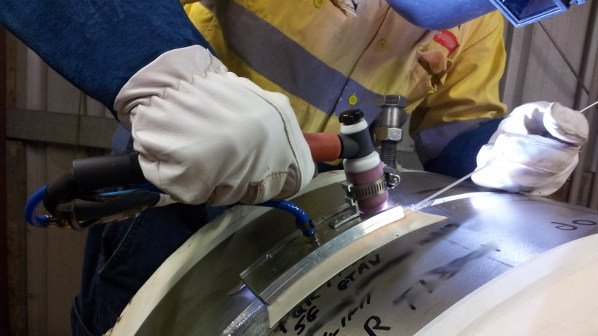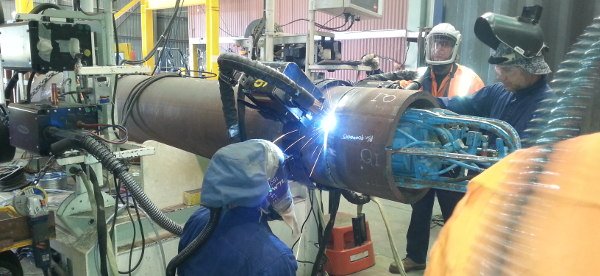WelderDestiny › Certified Welder
Certified Welder
Being a certified Welder is different to certifications and qualifications to most other trades. Most trades require you to have a trade certificate which shows that you have completed your apprenticeship and the associated examinations and practical tests. While some employers may require the same from Welders before employing them, this is actually unusual. Usually the employer is mostly concerned that the Welder can pass the practical welding tests as required by the relevant welding code that the Welder will need to weld to. Such a code required test is usually called a "coding test". A Welder that has passed such a coding test is usually called a "coded Welder".
The WelderDestiny Compass: Weekly e-zine Subscription
You can take a look at "The WelderDestiny Compass" back-issues by clicking here.
The
results of the coding test are captured on a document typically called a Welder
Qualification Record, (WQR) although this term can be slightly different
between different codes. This Welder qualification record is typically signed
and "certified" by the employer and / or third party inspection
organization. For this reason, a coded Welder is also often termed a
"certified Welder".
 Welder Performing GTAW Coding Test on Titanium
Welder Performing GTAW Coding Test on TitaniumThe Difference Between a Coded and Certified Welder
Many
people will dispute that a coding or code qualification is the same as being
a certified Welder. In fact, the definitions relating to these terms in many
standards would suggest that they are different. Within industry these terms
are however (rightly or wrongly) largely interchanged. Having said this, it
will be worth your while to enquire exactly what an employer is looking for
when they ask for a certified welder. The question should be: Certified to
what? If they refer to a standard welding code like ASME IX or AWS D1.1, then they are indeed taking about code
qualification. If they reference a standard such as AS 1796 (in Australia) then
they are talking about something a little different. This certification is a
little closer to a trade test certificate, because it is also based on
theoretical knowledge and the demonstration of a wider set of Welder skills
such as the use of cutting and gauging equipment. We will look at this definition of a certified Welder a
little lower down on this page.
Welder Coding System
For now, let us get back to coding. The advantage of the Welder coding methodology is that essentially anybody that can pass the required coding tests can do welding work on the components associated with the welding code that the coding tests were done to.
The
disadvantage of this Welder coding methodology is that Welders have to keep on
doing these coding tests for their entire careers. Most of the time, when a
Welder moves from one employer to another (which can be rather often for
Welders working on construction projects or plant shut-downs) the Welder will need to
re-do the coding tests. This means that even highly experienced Welders with a
wide skill base will need to demonstrate even their most basic competence on a
regular basis.
This
Welder coding system does have the basic ability to weed out people without the
skills required to make code compliant welds, but it is also highly
inefficient. It is also not fool proof, because often people manage to pass the
coding tests that do not have the ability to deposit sound welds on a
consistent basis. In short, sometimes people get lucky and pass a test that
allows them to do work that they are actually not skilled enough to do. This
can result in major loss of money and time, and even put people's lives at
risk.
 Welder Performing Automated GMAW Test for Subsea Pipeline Welding
Welder Performing Automated GMAW Test for Subsea Pipeline WeldingIndependent Certified Welder Schemes
As
mentioned earlier on this page, there are other certified Welder schemes
that are somewhat separate from the welding codes themselves, although some codes will refer to these independent certified Welder standards. The intention
being that the Welder can be certified to a common set of tests after meeting
certain requirements in terms of training and experience, that can then be
transferred between employers. Generally such certified Welder schemes are based
on national standards that will only be recognized within a specific country or
state. Within Australia, for instance, AS 1796 is such a standard. You can
think of this as a "mini Welder trade test certificate". Generally
these certified Welder schemes will have different certification levels, or
designations, to show different types of skills. (Usually based on different
welding processes and difficulty level of the tests passed.)
If
you are able to attain such a Welder certification, it may be worth your while,
but please understand that in most instances you will still need to pass the
necessary code qualification tests before you can do the work. These
certified Welder schemes are helpful to employers to select potential Welder candidates
to subject to the coding tests based on being "pre-selected" by a
(hopefully) respected process. In the same way, it can help the Welder to
differentiate him / herself from other candidates. Often
these certified Welder schemes are however largely discounted, as employers tend to rather focus
on previous experience of the Welder when compared to the work at hand.
In
short, being such a certified Welder can be advantageous, but it is rarely a
requirement to be considered for employment. Employers are concerned with your
past experience and reputation. This type of certification is only one way of
demonstrating this. There are other ways to demonstrate ability, experience and
reputation.
Welder Coding Tests
The
actual Welder coding tests are rarely standardized in any meaningful way. The
Welder coding tests are based on the work that you, the Welder, need to be able
to do on the job. Some types of work are very simple, so the coding tests do
not require a high level of skill. For instance, if you will be required to
just weld together small sections of structural steel with fillet welds in the
flat position, then you will only be required to pass a fillet weld test in the
flat position. Most people would be able to pass this after a couple of days worth
of practice and instruction. If however you will be required to perform a
single sided pipe weld on a corrosion resistant alloy in a situation where you
cannot rotate the pipe, then you will need to do a test that simulates this,
which would be a much more difficult test.
Once
you start to think of all the different welding codes, welding processes,
material types, welding positions etc. It starts becoming clear that
potentially there are thousands of different coding tests that you may have to
do in your career. To get an idea of typical Welder coding tests, click here.
Welding Codes
The
basis of performing Welder qualification tests, or coding tests, is the welding
code that requires the test in the first case. There are a large number of
different Welding codes. The reasons for the large number of codes are:
- Welding codes tend to be industry and application specific. (e.g. Piping; Pipeline; Structural; Aerospace; Petrochemical etc.)
- Welding codes tend to be jurisdiction specific. Historically different countries and / or regions in the world have developed their own codes. While theoretically it would be possible for everyone to just go to a single set of codes, there are political and strategic reasons that states and organizations may not want to do this.
To
get more information on the typical codes used for Welder qualifications, click here.
Code Essential Variables for Welders
When
deciding what coding tests a Welder needs to perform, we need to ask ourselves
what the extent of qualification is for any given Welder qualification test. If
the Welder needs to perform a weld that is outside the extent of qualification
of one of the Welder's existing coding tests, then the Welder will need to
perform another Welder qualification test. The extent of the qualification of
any specific Welder coding test is based on the qualified ranges of the
relevant Welder essential variables of that specific welding code.
These
Welder essential variables are those factors that change the skill necessary to
perform the welding. Typically these are factors such as the welding process;
material type; material thickness; welding position etc. Click here to get more information on typical
Welder essential variables.
WelderDestiny › Certified Welder
The WelderDestiny Compass: Weekly e-zine Subscription
You can take a look at "The WelderDestiny Compass" back-issues by clicking here.
Your Input Regarding Welder Certification
Are you in the Welder certification and coding business? Do you have some additional insights you would like to share? Please share your experience and insights regarding any aspect of Welder coding or certification that could help others.